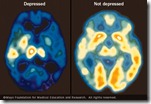In Western culture, depression has 2 very distinct definitions, one used by clinicians and mental health professionals and the other used in every day language. In Western layman’s terms, depression is often used as a substitute for sadness or disappointment (e.g. “I’m so depressed that I lost my favorite keychain”).
South Asians have yet a third definition of depression that is not accounted for in either the psychological terminology nor the Western common language. South Asians believe depression is when there are relational problems that are not resolved or resolvable. As an answer to the question, “What is depression” many South Asians answer that depression is a situational issue. I fight a lot with my husband. I don't get along with my mother-in-law. My boss and I constantly butt heads.
Because of these vastly different definitions of depression between Western and South Asian culture, depression very often goes un-diagnosed in South Asians. In addition, South Asians tend to express their depressive symptoms through their body more so than their emotions and as such, doctors fail to recognize the symptoms.
The downside to both the Western and South Asian layman’s definitions is that they assume the depressed person is in control of their situations and can “snap out of it” or “get over it” easily. There is an assumption that if you do something different, you will feel differently, which unfortunately is not the case. Depression is a long lasting, pervasive mood disorder, according to mental and physical health professionals, that goes far beyond sadness or a problematic relationship.
In fact, recent research is finding that even though South Asians do not express the emotional effects of depression as often as Westerners do, such as sadness, low mood, irritability, etc., there still exists a neurobiological element to depression, no matter how you define the term.
 Depression has a negative effect on our brain and neurons. Specifically, untreated depression leads to the atrophy of neurons in the pre-frontal cortex, an area associated with planning, reasoning and decision-making. The longer the individual lives with depression, the more neurons begin to die off and regeneration of neurons becomes increasingly difficult. This has implications for being able to plan successfully in the future, make good decisions as well as act in a socially appropriate manner.
Depression has a negative effect on our brain and neurons. Specifically, untreated depression leads to the atrophy of neurons in the pre-frontal cortex, an area associated with planning, reasoning and decision-making. The longer the individual lives with depression, the more neurons begin to die off and regeneration of neurons becomes increasingly difficult. This has implications for being able to plan successfully in the future, make good decisions as well as act in a socially appropriate manner.
In addition, many researchers have found that people with clinical depression have a smaller hippocampus, a brain structure associated with memory, mood regulation and learning. This helps explain why people with depression often experience memory loss, why an intelligent person seems to be less successful academically or in the professional world or why depressed individuals often have a dampened emotional response to a situation (e.g. they seem less happy when they receive good news).
Several research studies concluded that even more than aging as a cause of brain and neural atrophy is the presence of depression at any age. The brain atrophy is prevalent for people of all ages with depression, including children and teenagers. On average people with depression have about a 9 to 17% smaller hippocampus than people who have never been depressed.
Treating depression early and effectively has an impact on your relationships, your physical health, the healthy development of your children as well as improving your brain functioning. If you suspect that you may be depressed, consult your physician or a mental health professional to prevent long-term damage.
Learn more about depression and its signs and symptoms.
We would love to hear your thoughts on this article. Please leave your comments below.
